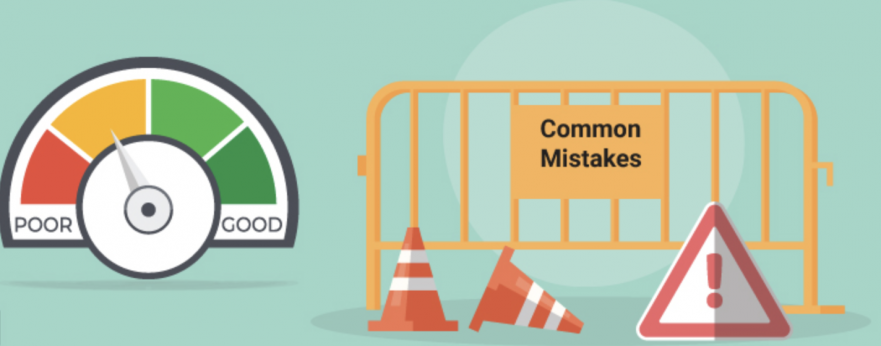September 2, 2021
Shawn Lane
Consumer Credit Expert
Most people think of a credit score as a concrete, unchangeable piece of data. The reality, however, is a bit more open to interpretation.
While your score is determined with a reliable algorithm, the incidents on your credit report that are used to calculate that score are often open to dispute – and in some cases, evidence of identity theft. In fact, research conducted by Consumer Reports found that about 34% of respondents had an error on their credit report.
Avoiding and disputing errors on your credit report can be tedious, but it’s the best way to protect your credit from being sabotaged. Here are some simple strategies to stay on top of credit report errors.
How to Avoid Mistakes on Your Credit Report
Here are the best ways to prevent errors from appearing on your credit report and hurting your credit score:
1. Monitor your credit reports regularly
The sooner you catch mistakes on your credit report, the easier it will be to deal with them. Monitor your credit report through all three credit bureaus: Experian, Equifax and TransUnion. It’s important to check all three credit bureaus, because one report may show a mistake that the other two don’t.
A good and reliable credit monitoring service is ID Club. If you use the link provided here, you will receive a 7-day trial of their 3-bureau credit monitoring service for just $1 ($19.95 per month once the trial period is over).
You can also pull your credit reports for free directly from the credit bureaus. The official site for free credit reports is www.annualcreditreport.com, where you can access a free credit report once a week. However, you will not receive any credit scores or be offered any form of credit monitoring, you will just receive a raw credit report.
You can also use a free service like Credit Karma, but Credit Karma only provides Equifax and TransUnion. You really need a service that provides all 3 credit bureaus which will email you when something changes on your credit report.
2. Freeze your credit
You can also freeze your credit. When you freeze your credit, it makes it almost impossible for scammers to open credit in your name. For example, if someone tries to apply for a credit card in your name, the credit card company will deny them due to an inability to run a credit check.
You will have to freeze your credit at all three credit bureaus separately. If you only freeze one credit bureau, the other two will still be active. Freezing your credit is free, and as of 2018, unfreezing it is also free.
The only downside to freezing your credit is that it may be a hassle for those who plan to buy a house or car in the future. Someone in this position would have to contact each credit bureau and provide them with a special password to unfreeze it. But a credit freeze is the only foolproof way to prevent scams and hacks.
3. Be aware of scams
Every time you give out your Social Security Number, credit card number, bank account details or other sensitive information, you run the risk of it falling into the wrong hands. That increases the likelihood that someone will use the information to open a credit card or loan in your name. Don’t provide that information if there’s any doubt in your mind.
What to Do If You Find a Mistake
Here’s what to do if you catch an error on your credit report:
1. File a dispute
If you see a mistake or error on your credit report, I recommend you mail a letter to the credit bureau in question notifying them of the error. Although the credit bureau make it easy for you to open a dispute on their website, I don’t recommended doing that as you give up some of your rights under the Fair Credit Reporting Act. Remember to view all three credit reports, because the mistake may show up on all of them. If it’s on multiple reports, you’ll have to dispute the mistake with each credit bureau individually.
You may need to provide proof of your identity, like a driver’s license. You’ll also have to explain what the mistake is and why you’re not responsible. In most cases, the credit bureau will respond within a month.
2. File a dispute directly with the provider
If the mistake comes from a credit card or loan that you actually own, contact the provider and dispute the transaction there. Most credit card companies have online portals where you can file a complaint easily. You can do this in addition to filing a dispute with the credit bureau.
Make sure to be persistent when dealing with any kind of credit report mistake. Remember, no one cares about your credit as much as you do.
If you have any questions or need help improving your credit, schedule a free credit analysis with a Financial Renovation Solutions credit consultant today.

